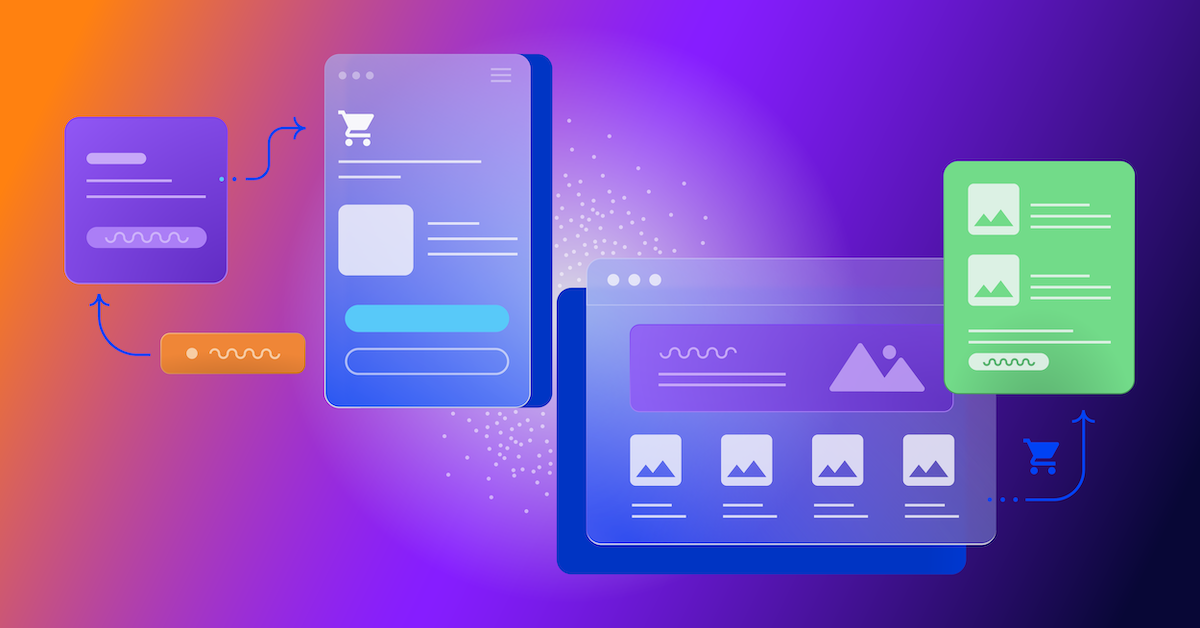The in-depth guide to enterprise commerce solutions and platforms
Enterprise commerce businesses have intrinsic needs, and a suitable platform can help these companies deliver personalized customer experiences and succeed.

Did you know that almost 35% of customers switched brands last year due to changing needs or expectations? For enterprise commerce companies with digital transformation initiatives, this meant significant increases in customer acquisition. Unfortunately, the brands that couldn’t anticipate their customers’ needs lost their buyers and some revenue.
How can your business fall into the first category and be successful? The right enterprise commerce solution or platform is vital.
We’ll consider several factors when choosing the right solution. But first, let’s review what an enterprise commerce solution is.
Key takeaways:
- An enterprise commerce platform is an advanced solution that helps high-volume businesses sell products or services online and offline.
- The size and reach of a company and establishing if the existing commerce platform is meeting the company’s needs will determine if you need an enterprise commerce solution.
- When choosing an enterprise commerce solution, several factors are modularity, scalability, security and omnichannel capability.
What is an enterprise commerce solution?
Enterprise commerce businesses have more intrinsic needs than small ones. Enterprise commerce brands offer multiple goods or services and tend to have a global presence with annual revenues starting in the tens of millions of USD. These businesses can be retailers, manufacturers or distributors and work in B2B or B2C.
An enterprise commerce platform is an advanced solution that helps high-volume businesses sell products or services online and offline. With enterprise commerce solutions, brands can:
- Automate and streamline processes
- Boost overall organizational efficiency
- Adapt to change faster
- Get visibility on multiple digital touchpoints
- Widen their customer base by speeding up the buyer journey and building better customer relations
- Receive data-driven insights for strategic business growth
- Improve sales
Enterprise-level solutions typically have global localization features like time zone, currency and language customizations.

When are you ready for an enterprise commerce solution or platform?
How do you know if an enterprise commerce solution is a good fit for your business? Consider the following questions:
- Are multiple brands or product lines under the umbrella of my company?
- Does my organization have hundreds of employees and millions of customers?
- Is my company’s annual revenue at least $10 million?
- Does my current solution lack SEO and mobile optimization?
- Do I struggle to provide personalized user experiences with my existing platform?
- Do I need to integrate third-party tools and emerging technologies but find them challenging?
- Am I missing some payment options at checkout?
If you replied “YES” to at least five of these questions, you are ready for an enterprise commerce solution.

10 Things to consider when selecting a solution
Now that you’ve determined you need an enterprise commerce platform, how do you choose the right one? Here are ten items to consider.
1. Technology to future-proof the brand
Since the future is unpredictable, how can you integrate technology to future-proof your brand? The most straightforward way is to use a SaaS-based solution. Software-as-a-service solutions are cloud-based, so there is a constant investment in development and advancement. These continual efforts result in plenty of e-commerce platform options for large-scale businesses.
2. Modularity
A modular system is one with distinctive units that effortlessly come together or separate. Why is this significant? A modular solution allows a technician to tweak one of the components without affecting the function of others, meaning you can add, remove and replace components seamlessly.
3. Scalability
A scalable system can accommodate an increase in workload (e.g., more users, transactions, data storage.) This feature affords an organization several advantages:
- You buy what you need now, having a leaner product that suits current needs without extra density.
- It requires a lower up-front cost.
- Scalability allows for shifting priorities.
- The organization can use the same software for longer since it can grow with the business.
- Adding features to scalable software is less costly.
- The employee learning curve for using the software is not steep.
4. Speed
Is website speed critical? Take a look at these statistics:
- One in two visitors will leave a website that takes more than 6 seconds to load.
- Fifty percent of shoppers will abandon their carts if the page doesn’t load fast enough.
- Forty-six percent of customers blame the business’ lack of infrastructure to run a functional website when they experience slow page loads.
Therefore, ensure that your enterprise commerce solution can deliver excellent speeds even during heavy traffic.
5. Frequent automatic security updates
Security is the number one reason to have automatic updates in place. Data breaches, cyberattacks and identity theft are too common, and software vulnerabilities permit cyber criminals to access your company’s resources.
Also, technology is constantly evolving, and updates provide the latest features.
6. Artificial intelligence
AI can take customer data and provide reliable recommendations, leading businesses to be more data-driven. Furthermore, they can tailor product merchandising. Customer service agents leverage AI to assist them in responding to customer queries and complaints with empathy. Chatbots are AI-based and provide customers with a self-service portal for simple questions or issues.
7. Fast time-to-market
Time-to-market (TTM) is the time it takes from pitching a product or feature idea until it is available to customers. A fast TTM offers you a competitive edge, where you can react sooner to market changes and continuously be one step ahead of the competition. The ideal enterprise commerce solution will automate your processes, such as testing and deploying.
8. Omnichannel capability
Your commerce platform should enable businesses to promote goods and services across multiple channels like email, search engines and social media. Having the backend data in one central location is necessary for this capability.
9. Personalization
Personalization means creating a unique experience tailored to the individual customer and is essential because buyers expect it. At the outset, we mentioned that customers gravitate to businesses that can anticipate their needs and expectations, so an enterprise commerce platform must include this feature.
10. Third-party integration
Your commerce platform should integrate or include tools like a content management system (CMS), customer relationship management (CRM) system, enterprise resource planning (ERP) and more. You should be able to tie current and future business solutions for a complete view of your customer and organization data.
Partner with Optimizely for your enterprise commerce solution
Your capacity to harness modern technology to enhance performance and provide your customers with pleasant digital experiences is the difference between falling behind and being ahead of the curve. When It comes to the perfect enterprise commerce platform, Optimizely is the right choice.
Contact Optimizely today to elevate your customers’ experiences to the next level.
